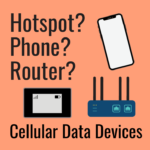One major cost of cellular based internet data is taxes and usage fees. The Tax Foundation just released their 2014 study, finding that the average American consumer pays 17.05 percent in combined federal, state, local and fees on wireless services in general.

The taxes & fees however vary widely based on local taxation, which can be figured on both the billing address of the account and maybe where the service is actually utilized depending on local access regulations.
This makes it very difficult for travelers to determine what their final bill will be each month from the major carriers, especially for frequent travelers like many bandwidth dependent RVers tend to be.
For full time RVers, their state of domicile can play a heavy role in the final cellular bill. Here are the combined local and federal rate averages for the top three states RVers tend to choose:
- Texas: 11.73%
- South Dakota: 13.02%
- Florida: 16.53%
All cellular phone services have a 5.82% federal rate, and local/state taxes average out at 11.23%. Combined, this makes the average rates more than double the average sales tax rates for most other goods and services.
However which taxes & fees that are imposed can vary based on the type of device and local fees & taxes.
For instance, federal taxes, and some universal service charges and 911 surcharges typically don't apply to data only devices like hotspots and tablets, but will apply to smartphones. And some of the percentage based taxes don't apply to shared data buckets, which have become quite prominent on the carrier's 'mobile share plans' - the fees are imposed on each individual phone line.
We just took a look at our AT&T bill for our Florida billed mobile share plan of two smartphones and a large bucket of data. The taxes & fees are charged by the phone line, and our data bucket is untaxed. We looked at some older bills when we had a tablet on the plan, and did not have federal, universal service charges or 911 fees applied. This makes the majority of our cellular bill untaxed, as the data definitely makes up most of our costs. This may vary in other states.
Definitely a consideration when looking at the service rates posted on the carrier's websites. Some resellers, such as Millenicom, include all taxes and fees in their advertised price - making it straightforward to know each month what you'll actually pay.
How can you determine what your taxes and rates will be? Start with the Tax Foundation's chart for your state of domicile to get a general guideline. If you need a firm quote, ask your carrier before signing up for an estimate.







 Mobile Internet Resource Center (dba Two Steps Beyond LLC) is founded by Chris & Cherie of
Mobile Internet Resource Center (dba Two Steps Beyond LLC) is founded by Chris & Cherie of